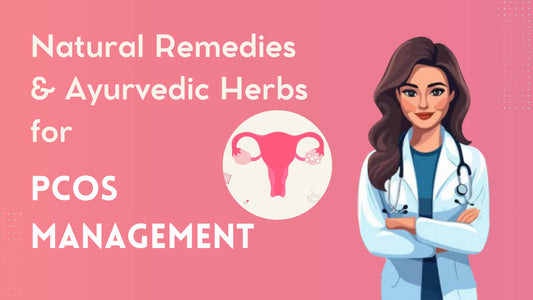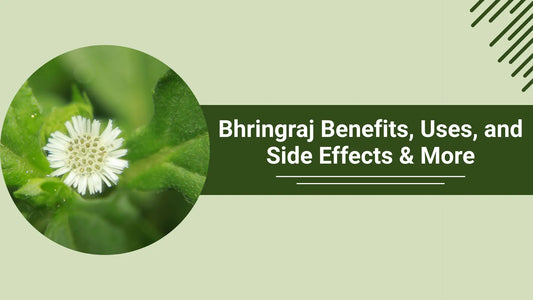
Natural Remedies & Ayurvedic Herbs for PCOS Management
In India, PCOS and PCOD is no longer a rare condition; millions of women deal with high levels of the male hormone regularly.
This disorder has no known cure and lasts for a very long time. However, some symptoms can be controlled with ayurvedic medications and lifestyle changes.
What is PCOS as per Ayurveda?
According to Ayurveda, PCOS is not classified as a single illness, but rather as a confluence of hormonal or menstrual (Artavadushti) and genital disorders (Yonivyapat).
Aside from severe endocrine disorders, this chronic illness can lead to irregular menstrual cycles, obesity, facial hair growth, and even the process of hair loss on the scalp. A woman might start to lose her self-worth as a result of it.
Ayurvedic Concepts
Doshas: Vata, Pitta, Kapha
A higher Kapha causes hormonal changes in the female reproductive system. When combined with the inflammatory qualities of Pitta, this can cause damage to the body's tissues. Further, it might lead to the formation of ovarian cysts.
Agni: Digestive fire
The cold and sticky factor of elevated Kapha usually results in weakened digestive Agni.
Ama: Undigested Material
The inability of the digestive agni to process food digestion due to hormonal imbalances and elevated kapha and weak pitta causes an accumulation of toxins and undigested food in the intestinal gut.
Prakriti: Individual Constitution
As one goes through hormonal changes due to PCOS, she begins to feel irritable. Her mood swings could cause her to become disinterested in her usual activities and life.
Natural Remedies for PCOS Management
Nuts and Seeds
Keeping a habit of munching on different nuts and seeds in small intervals as a snack before lunch and before dinner may control your hunger pangs and also nourish your reproductive tissues and increase estrogen levels.
Those revitalizing nuts and seeds may be almonds, walnuts, cashews, groundnuts, chia seeds, and flax seeds.
Moong Sprouts
Eating moong sprouts can promote insulin resistance in the body of the female who is suffering from PCOD. It may be effective in managing high blood sugar and excess fats by increasing the uptake of sugar by the cells.
The phytoestrogens in the reproductive system may enhance the hormonal balance in moong sprouts.
Chasteberry
It is another natural remedy that may help prevent hirsutism, or the growth of unnatural facial hair that typically affects many women who suffer from PCOS.
It might increase the female hormone, which would prevent the androgen hormone from having an abnormal effect on the female and cause alopecia on the scalp and unusual hair growth in other areas of the body.
Green Leafy Vegetables
A woman's body would need an abundance of vitamin B and fiber to strengthen reproductive tissues and gain insulin.
Regular consumption of spinach, broccoli, and kale and peas may help recover from such deficiencies. It could support healthy weight loss, help with menstrual cycle regulation, and speed up the natural process of getting pregnant.
Turmeric
Curcumin, the bioactive component of turmeric, can significantly manage inflammation reduction existing in PCOS patients.
She may therefore discover that her circumstances have improved, being free of obesity, insulin resistance, and irregular periods.
Dark Chocolate
PCOS women suffer from a deficiency of minerals like calcium, zinc, magnesium, and copper and face irregular menstrual cycles.
Eating dark chocolate may nourish the female with such nutrients and prevent uterine contractions.
Green Tea
You can include green tea in your regular diet, as it may help to relieve menstrual cramps.
It might lessen hyperandrogenism, assist in controlling insulin resistance, and facilitate the process of reducing weight.
Ayurvedic Herbs for PCOS Management
Shatavari
Shatavari is extremely beneficial for female reproductive health. It may reduce anovulation issues by regulating menstruation.
Regular intake of Shatavari may not make the female experience further the problem of ovarian cysts.
Kaunj Beej
Regular Ayurvedic practices inspire the use of Kaunj beej or velvet beans to manage the crisis of ovulation and fertility in females who are suffering from PCOD.
Ashoka Extract
Women with PCOS have been found with arthritis. However, an extract from the bark of Ashoka has therapeutic qualities and may stimulate inflammation reduction in joints apart from relieving menstrual cramps. This herb is suitable for all age groups of women.
Ashwagandha
Any registered Ayurvedic physician has always recommended it to soothe agitated minds and nerves. Ashwagandha might encourage menstrual regularity and improve women's mental health.
Spearmint
This particular herb, which is a member of the mint family, may help balance female hormones.
Drinking spearmint tea may prevent the development of endometriosis, a lining that grows outside the uterus. This lining may prevent anyone from getting pregnant.
Is there any ayurvedic medicine for fertility issues in women?
To address infertility, PCOD and PCOS, Ayush For Women is a natural supplement designed specifically for women.
Several natural ingredients, including Ashwagandha, Shatavari, and Ashoka extract, are included in it to support the ovaries and other reproductive organs, as well as to control female hormones and fertility.
There is extremely little chance that this herbal supplement will cause any negative effects.
Summary
Any woman's reproductive health is at risk from PCOD or the formation of ovarian cysts, so these conditions should not be ignored.
Such deviant reproductive conditions may decrease the chances of conceiving naturally. In addition to dietary and herbal remedies, incorporating mudras for PCOS may also offer benefits.
Nuts, seeds, fruits, vegetables, and certain ayurvedic herbs may naturally balance female hormones, rejuvenate the reproductive system, and reduce the risk of infertility compared to any advanced fertility treatment or medical intervention.

Dr. Meghna
Dr. Meghna is a skilled General Ayurveda Physician, full of passion and devotion for integral health that can be seen through work. She has expertise in both men's and women's health and focuses more on infertility and sexual health disorders. She brings together the ancient Ayurvedic practice and modern wellness approaches for effective holistic treatment of patients.



